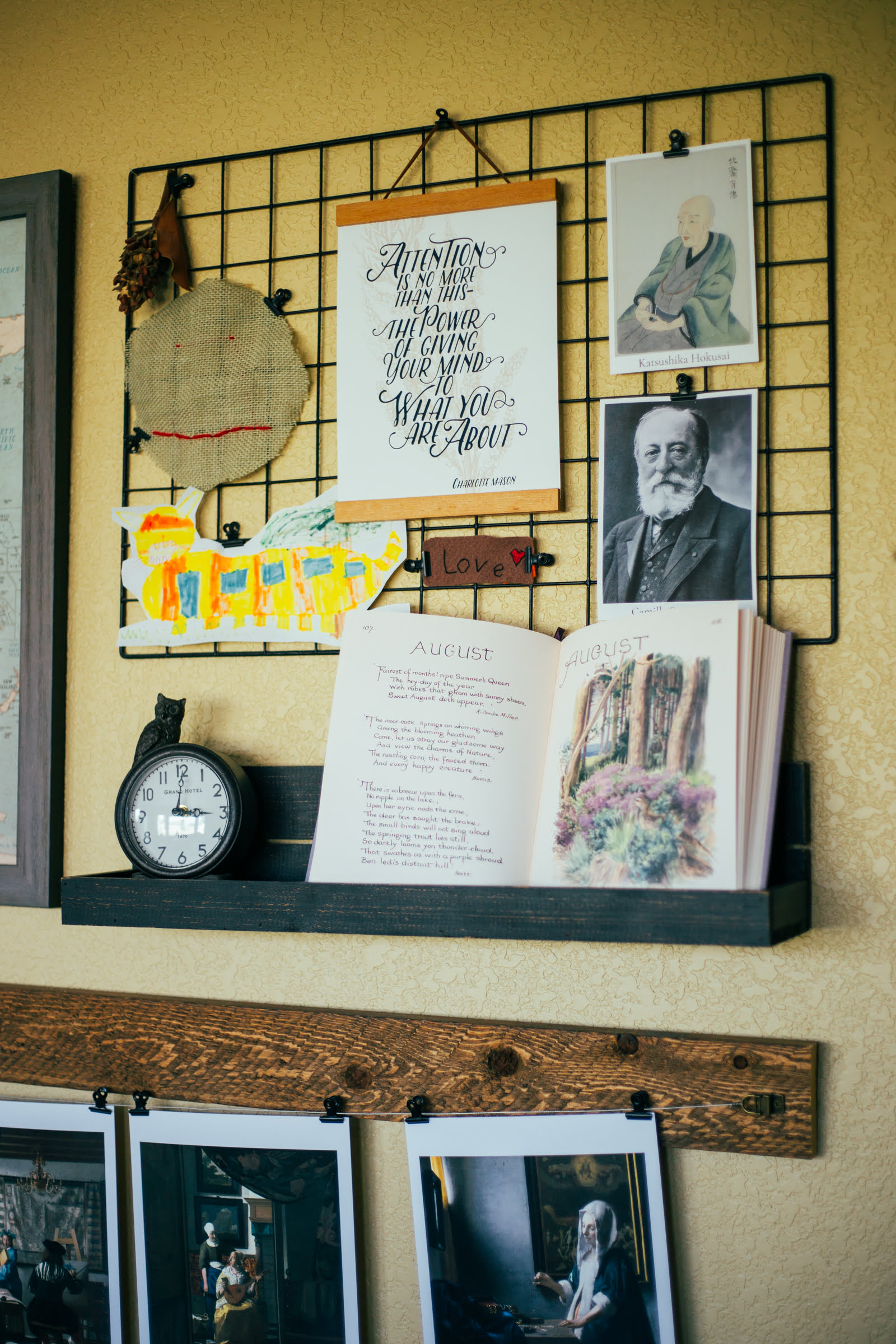Hope in Habits

I have written before about the many aspects of Charlotte Mason’s philosophies that drew me to her. I loved the idea of using living books instead of textbooks, children being born persons, and, of course, the role of art in a child’s education. And though I really feel like I’ve only skimmed the surface of her writings, as I’ve made my way through her books and deeper into her articles, there are other parts that have resonated with me even more than these initial attractions. Lately, the topic that I have pondered the most has been habits.
Ms. Mason wrote extensively about habit formation and the powers of this little-used tool not only in education, but also in the raising of children. Honestly, prior to reading her books, I never thought much about habits, other than the bad habits I have cultivated in myself over the years. I didn’t consider the idea that getting into a habit could actually be beneficial.
In Home Education, she sums up habit formation in this way:
…the body, and every part of the body, accommodates itself very readily to the uses it is put to: we know that if a child accustom herself to stand on one foot, thus pushing up one shoulder, the habit will probably end in curvature of the spine… The physical consequences of bad habits of this sort are so evident, that we cannot blind ourselves to the relation of cause and effect. What we are less prepared to admit is, that habits which do not appear to be in any sense physical––a flippant habit, a truthful habit, an orderly habit––should also make their mark upon a physical tissue, and that it is to this physical effect the enormous strength of habit is probably due. Yet when we consider that the brain, the physical brain, is the exceedingly delicate organ by means of which we think and feel and desire, love and hate and worship, it is not surprising that that organ should be modified by the work it has to do; to put the matter picturesquely, it is as if every familiar train of thought made a rut in the nervous substance of the brain into which the thoughts run lightly of their own accord, and out of which they can only be got by an effort of will.
Charlotte Mason – Home Education, p. 114
And even if we don’t actively try to form habits in our children, they are still formed:
In the first place, whether you choose or no to take any trouble about the formation of his habits, it is habit, all the same, which will govern ninety-nine one-hundredths of the child’s life: he is the mere automaton you describe. As for the child’s becoming the creature of habit, that is not left with the parent to determine. We are all mere creatures of habit. We think our accustomed thoughts, make our usual small talk, go through the trivial round, the common task, without any self-determining effort of will at all. If it were not so––if we had to think, to deliberate, about each operation of the bath or the table––life would not be worth having; the perpetually repeated effort of decision would wear us out. But, let us be thankful, life is not thus laborious. For a hundred times we act or think, it is not necessary to choose, to will, say, more than once. And the little emergencies, which compel an act of will, will fall in the children’s lives just about as frequently as in our own. These we cannot save them from, nor is it desirable that we should. What we can do for them is to secure that they have habits which shall lead them in ways of order, propriety, and virtue, instead of leaving their wheel of life to make ugly ruts in miry places.
Charlotte Mason – Home Education, p. 110
I appreciate her comparison of habits as “ruts” as it has made this concept easy to explain to my children. In our backyard, we have left a portion of it (called “the meadowlands”) wild for their use and they have, over the last five years, worn several paths through the grass in this area. When we talk about habits, I compare those habitual neural ruts to the paths they’ve made in the meadowlands and I think it’s easier for them to visualize what’s going on in their brains. If they want to make a new path, they have to start walking a certain way in the meadowlands over and over again to get it to form.
I do believe habit formation is essential to education and character-building, not only based on what Ms. Mason has written but also on what I’ve seen with my own kids. It can take a lot of work, in the beginning, to lay down those tracks (or “rails” as she says later on), but is entirely worth it to “secure smooth and easy days” as well as give our children a better future.
There have been many posts on other sites written about habit formation and how to go about it, what it looks like, the benefits, etc. and I feel others have covered that aspect very well, so I won’t go into that any further. What I really wanted to write about today is the hope that is found in habits.
It is no doubt true that children inherit a certain tendency to irascibility or to amiability, to fretfulness, discontentment, peevishness, sullenness, murmuring, and impatience; or to cheerfulness, trustfulness, good-humour, patience, and humility. It is also true that upon the preponderance of any of these qualities––upon temper, that is––the happiness or wretchedness of child and man depends, as well as the comfort or misery of the people who live with him. We all know people possessed of integrity and of many excellent virtues who make themselves intolerable to their belongings. The root of evil is, not that these people were born sullen, or peevish, or envious––that might have been mended; but that they were permitted to grow up in these dispositions. Here, if anywhere, the power of habit is invaluable: it rests with the parents to correct the original twist, all the more so if it is from them the child gets it, and to send their child into the world blest with an even, happy temper, inclined to make the best of things, to look on the bright side, to impute the best and kindest motives to others, and to make no extravagant claims on his own account––fertile source of ugly tempers.
Charlotte Mason – Home Education, pp. 166-167
At times I have felt a sense of urgency in the raising of my children. I am so often reminded by the world around me that these childhood years are fleeting and I only have a certain amount of time that I am such a large part of their lives. If I don’t do a specific thing by a specific age, then they are Ruined For Life! I remember especially when they were tiny, reading so many things about those first two years, and then the first six years, and then the first twelve years, etc., making mental calendar entries marking by which date I needed to do which thing. And with that came great responsibility and, eventually, great guilt because, of course, I have failed miserably as each of these milestone dates has passed me by.
Within the Charlotte Mason world, this manifests in habit formation and getting those rails laid down at as young of an age as possible. This isn’t necessarily a bad thing, depending on how it is executed; obviously, we want the best for our kids from the very start, including habit formation. But what about those of us who found Charlotte Mason later in our children’s lives? Or those of us who knew what she wrote about habit formation when they were still tiny but didn’t have the time, energy, or resources, to get those habits in place?
I’ll go back to my original example of the paths in our meadowlands and dive further into the illustration. When I tell my kids that we need to walk on a specific route in the yard, taking the same footsteps each time in order to form that path, they can experience that and see how it relates to thoughts and actions being repeated over and over again to form a habit, or rut, in our brain. On the other hand, if we decide we don’t want a specific path anymore, say because it’s the home of a small animal we don’t want to disturb, we mentally put up a “Closed for revegetation” sign and don’t take that path anymore. Every once in a while, because we’re so used to going that way or because it’s a shorter route or maybe we’re curious about the small animal, we find that we’ve gone along the old path, but we catch ourselves and try again the next time. We keep on keeping on because we know that’s the better path to take and as we choose the new path time and time again, eventually the old path becomes fainter and overgrown with alpine daisies and stork’s-bill and blue grama.
Likewise, with habits, we can find ourselves falling back into those old patterns, but we (or those around us as in the case of parents and children) correct ourselves, and the next time we have a choice, we consciously make the effort to not allow ourselves to fall into the rut again. As we make that choice over and over again, eventually those old cerebral ruts grow less indented and it’s much easier to follow the new ruts.
I will admit here that I didn’t get my kids started young on any of the habits Charlotte Mason emphasized for children. When I found Charlotte Mason, I had a 3.5-year-old, an infant, a husband who had been laid off from his job of ten years, and I was doing part-time virtual assistant work from home. We were not in a place where habit formation was even remotely on our radar (let alone reading all six of her books so I could know what habit formation even was). Basic survival was the task of each and every day. And while my kids didn’t necessarily develop any horrifically bad habits, there were definitely things I knew needed to be nipped in the bud.
We are only now beginning to discover how beneficial are the laws which govern our being. Educate the child in right habits and the man’s life will run in them, without the constant wear and tear of the moral effort of decision. Once, twice, three times in a day, he will still, no doubt, have to choose between the highest and the less high, the best and the less good course. But all the minor moralities of life may be made habitual to him. He has been brought up to be courteous, prompt, punctual, neat, considerate; and he practises these virtues without conscious effort. It is much easier to behave in the way he is used to, than to originate a new line of conduct. And this is so, because it is graciously and mercifully ordered that there shall be a physical record and adaptation as the result of our educational efforts, and that the enormous strain of moral endeavour shall come upon us only occasionally. ‘Sow a habit, reap a character’; that is, the formation of habits is one of the chief means whereby we modify the original hereditary disposition of the child until it becomes the character of the man.
Charlotte Mason – Parents and Children, p. 124
This is where the hope lies for me. If we can “modify the original hereditary disposition of the child,” we can most certainly lay down new neural ruts to replace the old ones. Just because I didn’t get those pathways started when they were young, I can still work on them now. I can help them choose the better paths because that’s my job as a parent. I can offer them good and beautiful ideas to inspire the formation of worthy habits and help them stay on those paths. It’s definitely not an easy task and takes time and effort, but the feeling that I’m almost being given a second chance when it comes to the formation of their character inspires me to keep trying every day. To keep laying down those rails and help them become better people.
And not only is this true for them, but it’s also true for me. The neural ruts that have been populating my brain for the last 40 years don’t have to be permanent and I think in many ways, I’m ready to introduce some alpine daisies and stork’s-bill and blue grama to the pathways of my own mind as well.









I think that last paragraph is everything, Rebecca! There is hope for us, too 🙂
Yes! Mothers are born persons as well, after all! 🙂
Thank you for sharing these thoughts, Rebecca. I find myself in the same place of regretting that I didn’t start habit training at an early age. I need this hope, and the grace it brings. I am grateful for your honest, humble, and grace filled writing.
Thank you, Lindsay! I have found that CM offers “second chances” and hope in so many ways!
I know this is an older post but I am so reminded about me in therapy and learning about new ways to think about myself and make new habits. It can work! So there is so much hope. And even us young moms who did find Charlotte mason early still don’t do a good job at laying down those tracks (me😬) thank God for hope and love and God.